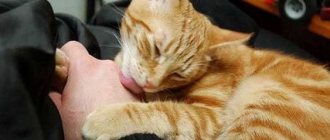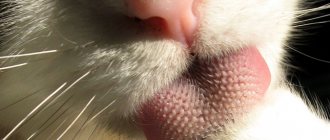Humanity is divided into catphiles, catphobes and those who have not yet defined their attitude towards domestic felines, and therefore treat them indifferently. Cats, in turn, are hostile to the former, but are not averse to communicating with the latter. They carefully scan the third ones: what if their disinterest is feigned, which means there is a chance to replenish the army of their fans.
The first guest is the sly one
Doesn't like cats, is interested in communicating with the owner. He sees a cat sitting in the hallway, realizes that this is everyone’s favorite, sharply bends down, reaches out his hand to pet the animal. He lavishes praise. He gets what he deserves for his cunning: “You’re kidding, boy,” the cat thinks. And the back arched, the fur stood on end, a menacing hiss, a paw strike, and flight. Until the stranger leaves, he watches him from hiding.
How to make friends with a cat
For a cat to see a true friend in its owner, it will not be enough to simply feed it and clean the litter box. Animal psychologists have found that kittens become attached to new people faster than adults, since they perceive them as their mother. Experts also highlighted several tips that will help owners quickly make friends with their pet:
- do not show aggression (for example, waving your arms, abruptly waking up, etc.);
- behave calmly in the presence of a cat;
- respect your pet;
- delight cats with new games or allow them something.
Such measures will help the animal feel more comfortable, which will significantly improve its relationship with its owner.
Guest second, unspecified
As he himself believes, he is indifferent to animals. He entered, saw, smiled, squatted down (although before this meeting he had not interacted closely with cats), apparently he felt that this was the right thing to do. He opened his palms and calmly allowed himself to be sniffed. The cat appreciated the observance of etiquette standards, butted his hand and rubbed it on his knee. In response, the guest carefully ran his hand over the fur and looked up at the owners: would they mind?
The new acquaintance entered the apartment and took the offered seat. Fluffy immediately put his paws on his lap, blinked slowly, and slightly closed his eyes. The guest mechanically repeated the signal, and the cat settled down next to him, purring. “Our man: understanding, kind. It’s not for nothing that he was marked,” decided the true owner of the house.
What kind of people do cats like?
The answer to the question of what kind of people cats love lies in the psychology of these animals, namely, in the peculiarities of their lifestyle and preferences. Cats love comfort and warmth, they can bask in the sun for hours and sleep up to 20 hours a day, and also spend a lot of time taking care of themselves - licking their fur and paws, “washing themselves,” etc. Most of the time cats behave independently , leisurely and measured, and only sometimes they want to run, jump, sharpen their claws and chase each other or live or toy mice. Therefore, representatives of the cat family love people whose habits resemble them. And vice versa, cats treat with distrust and wariness those people who are very different in behavior from purrs - they fuss, make a lot of sudden movements, are in constant tension, etc.
Animal psychologists, observing cats and their owners, have found that cats show love and affection for people who seem understandable to them and at the same time do not pose a danger to them. And cats determine this very degree of similarity and human safety by the following criteria:
- Voice. Cats are attracted to people with a pleasant timbre of voice, who speak calmly, slowly and with soft intonations. And since nature has endowed women with a more gentle and pleasant-to-hear voice, it is not surprising that cats often love the fair sex more than men. However, a cat may well get used to a man’s voice and fall in love with its owner if he does not scream, hiss and make other sounds that are frightening and unpleasant for the animal in her presence.
Movements. Cats like people who move slowly and leisurely much more than fussy and impetuous individuals, since these animals can perceive sharp swings of their arms, a swift gait and any impetuous movements as a potential threat to themselves.- Smell. Everyone knows about the ability of dogs to distinguish many odors, but few people know that cats also have a very sensitive sense of smell and, not least of all, evaluate new acquaintances by smell. As a rule, felines do not like people who smell like dogs, other cats, alcohol, vinegar, or too strong perfume.
- Attitude towards the cat. Surely many cat owners have noticed that their furry purrs show much more sympathy for those guests who are indifferent to them, but they avoid people who immediately try to pick up or stroke the animal. The explanation for this love of cats for those who do not pay special attention to them is simple: cats, being independent animals, value their personal space and really do not like annoying pesters. The animal will most likely hide from a person trying to stroke and cuddle an unfamiliar cat at the first opportunity. However, natural curiosity is also inherent in cats, so sooner or later they will want to get to know and study a person who is next to them, but who is not paying attention to them.
Of all the family members , the cat will most likely choose the calmest person as his owner and pet, who feeds and cares for the animal, but at the same time does not impose his love on him - does not try to constantly squeeze and stroke him, does not bother him during sleep and rest, etc. And vice versa, cats are often indifferent to children and do not like to play with children too much, since these independent animals do not like to be carried for a long time in their arms, squeezed, dragged by the tail, and even more so, dressed up like a doll.
The cat asks for help
In addition to the positive aspects, a cat can call for help while chasing a person. If your cat is afraid or in pain, she will try to get your attention in any way possible. If your cat is meowing loudly and won't leave you alone, you should consider the possibility that she is in pain or fear.
If you suspect your cat is in pain, you should take her to a veterinarian for a proper diagnosis.
But why would someone lost on the street chase me and not other people? If you are a cat owner, the answer is simple. There is something about your scent that makes a stray cat realize that you have a cat in the house. This will make you reach out to them with the hope that you will bring them home too. In addition, stray cats crave the safety and help of others.
Cat has separation anxiety
Cats can develop separation anxiety if you leave them alone too often. If you've been covering up your cat too much, separation anxiety will increase if she has a sudden change in her routine or environment. When in a new home or around new people, your cat may seek out your presence. This will lead to endless chasing and meowing near you.
Additionally, genetics may have something to do with a cat's risk of developing separation anxiety. Breeds such as Burmese and Siamese cats can become overly attached to their owners and may develop separation anxiety along the way.
How to understand that a cat loves you: signs of cat love
Cats have their own system of signs of affection, aggression and other feelings. You need to be able to read these signs. So how can you understand that a cat loves its owner?
Butting
If a cat butts you with its head, it means it trusts you as a friend. Plus, it's a way to mark you for other cats, so they know that this owner is already taken. By the way, not only small cats can butt heads, but also their big ones.
Read also: Why beef is tough
Rumbling
Cats can purr for a variety of reasons, including when they feel unwell. But in combination with other signs, a good owner will always understand when a cat purrs from a state of comfort and bliss. The rumbling intensifies or begins when she is stroked by her beloved owner.
Tail pipe
If a cat frantically beats its tail on the surface when you touch it, expect trouble: it is unhappy. But, if a cat raises its tail when it sees you, it means that it is happy, feels confident and is glad to see you.
piggy back ride
When a cat rolls on its back, exposing its belly to you, it is expressing its trust. And even if, when you put your hand on it, it starts to bite you, anyway, cats only show their belly to those they trust.
Read also: Bloody crusts in the nose
Licking
Licking your body and hair means that the cat perceives you as one of its own. By licking you, she shows almost maternal care.
Milky step
Cats remember the so-called milk step from childhood, when they drank their mother’s milk and ran their paws over her belly so that food would come. Now, when the cat, smearing itself on your lap, begins to massage them (sometimes painfully and with claws), do not be offended: he remembers the sweet moments of childhood and equates you to your mother.
Article continues after advertisement
Wink
If a cat can look into your eyes for a long time without blinking, this is a bad sign. But if she squints or winks at you, this is a sign of friendship. Do the same in return.
Co-sleeping
If a cat sleeps on you or next to you, this is one of the signs of love. They only sleep with those they trust. If the cat didn't trust you, it would sleep somewhere far away where it can't be seen.
Present
Don't scold your cat if she suddenly brings you a fly or mouse. This is a sign of higher, almost altruistic, love. The cat shares the trophy because he understands that the owner is unlucky and cannot catch anyone himself. This is also how she can show you her usefulness in the house. However, some scientists believe that these are not gifts to the owner at all, but an instinctive desire to bring prey to their territory.
Turning your booty
Often, cat owners are offended that cats, sitting in their arms, suddenly turn their backs. She sits in your arms with her butt facing you not because in this way she expresses her contempt, but because for predators this means something completely different: they turn their backs to their friend, because... they trust him and inspect the room at this time, as if protecting themselves and him from dangers.
Confidence
Cats would never allow their brothers to paw into their eyes or ears and pick something there, but they allow you to do this during hygiene procedures. Be proud: your cat trusts you!
Arching your back
When a cat arches its back, lifts its tail, and exposes its anus to you while you stroke it, it is not a sign of disrespect. This is a sign of the highest trust and love. They arch their back so that the pressure of your hands increases in the butt area: this is pleasant, because... there is a nerve node there. And they expose their butts so that you can smell their anal smell - this is a good sign.
Escort
Is your cat always nearby wherever you go? This means that, firstly, he is attached to you, and, secondly, he is an extrovert, because introverted cats, even despite their attachment to their owner, still need frequent solitude.
Cooperative games
Playing together, as long as it is not aggressive, is an act of trust. A cat won't play with someone it doesn't trust.
Article continues after advertisement
Do cats like to be kissed?
A logical question arises: how does the cat herself feel from hugs and kisses from her owner? Surprisingly, very few murks perceive this as affection and would like to receive it again and again. On the contrary, they see this as some kind of act of aggression and try in every possible way to avoid such a manifestation of feelings - they worry, hiss, and sometimes use their claws. It's simple - cats and people are not brothers and their ways of expressing emotions are completely different. If a cat responds to kisses with bites or scratches, this does not mean that it is aggressive or ill-mannered - it means that it has encountered an alien type of communication and does not understand how to behave. Or, on the contrary, she has already understood and clearly makes it clear to the person: “Stop it.”











